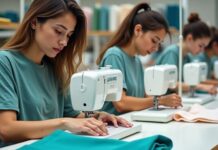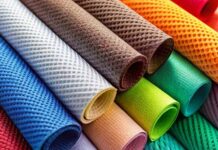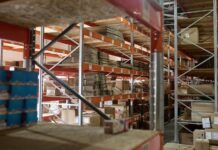Imagine a busy textile manufacturing plant with workers scrambling to meet production needs and equipment buzzing. Still, there is something unusual here.
We see as we navigate the factory floor that no one is checking each and every piece of cloth as it comes off the machines. Rather, a robust artificial intelligence system is analyzing the data in real time, and cameras and sensors are used to monitor the process.
This is the textile production of the future, where fabric manufacturing is being revolutionized by AI-driven quality control. We are able to increase the speed at which we create high-quality textiles by optimizing our manufacturing processes via the use of machine learning algorithms that identify flaws and irregularities in the production process.
This article will examine how artificial intelligence (AI) is transforming the textile sector, including automated quality control and smart fabric advancements, as well as the prospects for this innovative technology.
Important lessons learned
- AI-driven quality control solutions increase industrial processes’ accuracy and efficiency by instantly identifying flaws and irregularities.
- Predictive maintenance is made possible by smart manufacturing, which lowers downtime and boosts output.
- AI examines data to find trends and potential areas for improvement, streamlining workflows and cutting expenses.
- AI-driven quality control reduces waste and increases productivity, resulting in consistent and precise quality control that gives businesses a competitive advantage in the textile sector.
A Synopsis of The Textile Sector
Every time you put on an item of clothing, it probably went through a difficult procedure in the textile industry—something you may not be aware of. Weaving, knitting, dying, and finishing processes turn a variety of materials into final goods.
One enormous sector that makes a substantial contribution to the world economy is the textile industry. It gives us the materials and textiles we need for everyday living and employs millions of people globally. Nonetheless, there are several difficulties with the textile industry’s manufacturing process.
The size of the global textile market was estimated by Grand View Research to be worth USD 993.6 billion in 2021. From 2022 to 2030, the market is expected to expand at a compound annual growth rate (CAGR) of 4.0%.
One of the biggest markets for textiles is the United States, where exports are expected to reach USD 65.8 billion in 2022. India, with a market value of 223 billion US dollars in 2021, is the world’s second-largest manufacturer of textiles, behind China.
Quality control, which may be costly and time-consuming, is one of the main problems. Artificial intelligence (AI) is useful in this situation. Textile producers may automate the process and guarantee that the final goods fulfill the necessary requirements by using AI-driven quality control.
Artificial Intelligence in Textile Production
AI is transforming the textile manufacturing sector by increasing production processes’ accuracy and efficiency. Artificial intelligence has been used in smart manufacturing to make textile production more efficient and error-free.
Design Innovation and Development
AI has transformed the process of designing and developing products, revolutionizing the textile manufacturing industry.
Intelligent artificial intelligence (AI) algorithms help designers create distinctive and eye-catching textile patterns, textures, and colors by analyzing large quantities of data and learning from patterns.
AI speeds up the design process and makes sure that the goods meet client requests by using machine learning algorithms and evaluating databases of previous designs, trends, and desires.
Streamlining Manufacturing Procedures
AI-powered solutions have greatly improved textile manufacturing operations’ productivity and quality assurance.
AI algorithms examine fabric photos using machine vision technology to find flaws and anomalies and categorize textile materials according to their characteristics.
Fashinza’s analysis indicates that we may anticipate a 60–70% decrease in waste with the use of AI and cutting-edge technology, as the processes will be automated as accurately as possible. At least half of the garbage produced worldwide is industrial waste.
The majority of the waste is the result of industrial processes producing subpar goods. We Forum claims that AI can assist employees in cutting waste and improving quality at a lesser cost.
Manufacturers are able to reduce production waste, increase total output, and identify defects early thanks to the automation of quality control procedures. Costs related to defective or subpar goods are decreased when AI is integrated into manufacturing processes.
Simplifying the Management of the Supply Chain
Artificial Intelligence is a key component in textile manufacturing supply chain management optimization.
Artificial intelligence (AI) systems reliably forecast demand, optimize inventory levels, and suggest supply chain strategies by evaluating past data, market trends, and external variables like weather.
This helps manufacturers cut down on surplus inventory, minimize stockouts, and optimize their manufacturing schedules. AI integration boosts profitability and customer happiness in supply chain management.
Resource Management And Energy Efficiency
AI plays a key role in textile production, resource management and energy optimization.
Artificial intelligence (AI) algorithms monitor and regulate energy use, spot inefficiencies, and recommend methods to improve it by using real-time data from sensors and Internet of Things (IoT) devices.
This lowers operational costs and encourages the production of textiles in a way that is more ecologically friendly and sustainable.
Improving Customer Service With Artificial Intelligence Assistants
Chatbots and virtual assistants driven by AI have revolutionized customer service in the textile sector.
These virtual assistants engage with clients, respond to questions, suggest products, and help with online transactions.
AI chatbots provide individualized customer service around-the-clock by using machine learning and natural language processing skills, which boosts customer happiness and revenue.
Automated Inspection and Assessment
The use of human visual inspection for quality control was common in the past, but it had drawbacks. People are prone to overlooking minor flaws or becoming weary over time, which might cause irregularities in the inspection procedure. This is the point at which artificial intelligence and machine learning transform the textile sector.
Artificial intelligence (AI)-driven quality control systems are able to thoroughly examine every inch of fabric by using sophisticated algorithms and machine vision technologies.
The smallest imperfections, such misaligned patterns, loose threads, or discolorations, may be found by these clever technologies. They put forth endless effort to make sure that each outfit satisfies the highest requirements for quality.
AI-driven quality control not only expedites the manufacturing process but also raises the standard of the final product. Manufacturers may reduce waste and save important resources by preventing the buildup of defective items via real-time problem detection and resolution.
The influence of this technology on manufacturers and consumers has been significant. Manufacturers may now precisely match market expectations by producing high-quality textiles quicker. On the other hand, customers may feel certain that the clothing they buy has passed thorough quality inspections, guaranteeing their happiness and faith in the brand.
In the textile business, AI-driven quality control is revolutionizing manufacturing practices and changing the way they approach quality assurance and helping them to produce flawless goods that are unique in the market.
AI’s Role in the Fashion Industry
Artificial intelligence developments will revolutionize every facet of the fashion business, which is poised for a technological revolution.
AI-driven quality control in textile production is one instance of how machine learning is being used into the fashion industry. Fashion producers may reduce waste and increase productivity by using AI to ensure precise and consistent quality control.
They may also benefit from it for supply chain optimization and trend forecasts. A survey estimates that generative AI may boost operational earnings in the luxury, fashion, and clothing industries by up to $275 billion, with a $150 billion conservative increase over the next three to five years.
AI has a bright future ahead of it in the textile sector, particularly in the fashion business, where it has the power to completely transform the process from design to manufacturing. It is to be expected that an increasing number of fashion firms will be using AI-driven solutions as the technology advances and becomes more widely available.
Artificial Intelligence (AI) has the potential to revolutionize the fashion industry for years to come, from trend prediction to supply chain optimization.
FAQs
Which fashion firms are using artificial intelligence (AI) in their operations?
AI is being used by a lot of fashion firms to streamline processes, cut down on waste, and boost customer satisfaction. Tommy Hilfiger, Macy’s, Dior, Gucci, Adidas, Nike, and Louis Vuitton are a few brands that come to mind. For instance, Zara employs AI to streamline its supply chain and save waste, while Stitch Fix uses AI to customize wardrobe suggestions for its clients.AI is being used by a lot of fashion firms.
Which kind of AI is used in manufacturing to determine each fabric’s sewability?
Machine learning is the term for the kind of AI that is often used to evaluate a variety of materials’ sewability throughout manufacturing. To develop predictions and assess if a fabric is suitable for sewing operations, machine learning algorithms are trained on vast datasets that include details about sewing parameters and fabric features.
What part does AI play in intelligent manufacturing?
AI is used in smart manufacturing to provide robots the ability to learn from data and make deft choices based on that information. This might include activities like keeping an eye on manufacturing procedures, forecasting maintenance requirements, and allocating resources optimally to maximize effectiveness and minimize waste.
In summary
All things considered, the application of AI to the textile industry has produced encouraging outcomes in terms of increasing productivity, decreasing waste, and raising product quality. Manufacturers may maintain industry standards for their goods and streamline their manufacturing processes by using automated quality control systems and smart fabric advancements.
Artificial Intelligence in textile production seems to have a bright future as the fashion industry continues to change and the need for ethical and sustainable practices rises. AI may help firms remain competitive and satisfy customer expectations by analyzing data, predicting trends, and optimizing processes.
It’s evident that incorporating AI into the textile manufacturing process is essential for the sector to grow and be relevant in the years to come, not merely a passing fad.






























